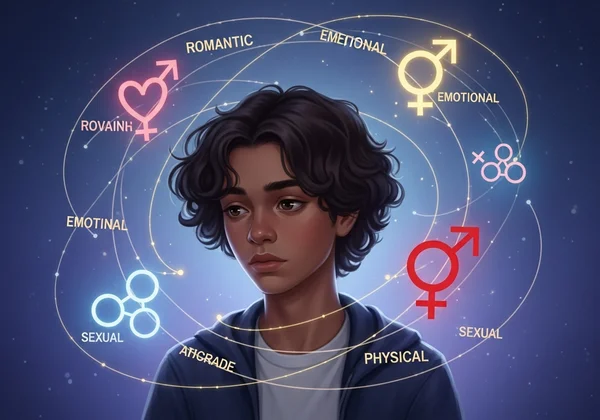Am I Gay Quiz in High School? Your Guide to Identity & Support
November 11, 2025 | By Isla Dawson
High school can feel like a maze. Between classes, friendships, and future plans, you're also figuring out the biggest puzzle of all: yourself. If you've found yourself asking questions about your identity and who you're attracted to, you're not alone. It can be a confusing, and sometimes lonely, experience. You might be wondering, is it normal to question my sexuality? Yes, absolutely, it's completely normal. This guide is here to walk you through those feelings, offer support, and show you that this journey of self-discovery is a valid and important part of growing up. For a safe and private starting point, our gay quiz can help you explore your identity with our online tool.

Is It Normal to Question Your Sexuality in High School? Take a Sexuality Quiz.
Absolutely. Adolescence is a time of immense change, not just physically but mentally and emotionally. Your brain is developing, your understanding of the world is expanding, and your sense of self is just beginning to solidify. It’s the perfect time for questioning everything, including who you are and who you love. Questioning your sexuality is not a sign that something is wrong; it's a sign that you are thoughtful, self-aware, and exploring the depths of your own identity. Think of it less as a problem to be solved and more as a journey of discovery.
Understanding Your Feelings & Attractions
A big part of this journey is untangling the different kinds of attraction you might feel. It's not always simple, and that's okay. People often experience:
- Emotional Attraction: The desire to be emotionally close to someone, to share your thoughts and feelings with them.
- Romantic Attraction: The desire for a romantic relationship with someone, which might involve things like going on dates or calling someone your partner.
- Physical Attraction: Finding someone’s physical appearance appealing.
- Sexual Attraction: The desire for sexual contact with someone.
These feelings don't always line up perfectly, and they can change over time. Giving yourself permission to explore these different facets of attraction without judgment is a powerful first step.
Common Signs You Might Be Questioning Your Sexuality
While there's no checklist that can define your identity, there are common experiences that might signal you're questioning your sexuality. You might recognize some of these in your own life:
- You find yourself more drawn to same-sex characters in movies, books, or TV shows.
- You daydream about being in a romantic relationship with someone of the same gender.
- When your friends talk about their crushes, you feel like your experiences are different or you can't quite relate.
- You feel a strong emotional connection to a same-sex friend that feels like it might be something more.
- You've searched online for an "am I gay quiz" or asked yourself "how to know if I'm gay".
If any of this sounds familiar, it's simply an invitation to explore further. These aren't definitive answers, but they can be helpful clues, guiding you toward a deeper understanding of yourself. Taking an LGBTQ quiz can be a pressure-free way to reflect on these feelings.

Finding Support: LGBTQ+ Resources for Teens
You don't have to navigate this journey alone. Finding a supportive community can make all the difference, providing a safe space to ask questions and share your experiences. Building your support system is a crucial step in feeling confident and secure in your identity.
School Clubs & Counselors: GSAs and Beyond
Your school can be a valuable source of support. Look for a Gender-Sexuality Alliance (GSA) or a similar LGBTQ+ club. These groups are designed to be safe, welcoming environments for students to connect, learn, and support one another. They are excellent places to meet peers who are going through similar experiences.
Additionally, school counselors are trained professionals who are there to help you. Their job is to provide confidential support for a wide range of issues, including questions about identity. Speaking with a counselor can give you a private space to talk through your feelings without fear of judgment.
Online Communities & Trusted Help Lines
The internet can be a powerful tool for finding community, especially if you don't have access to in-person resources. Reputable organizations like The Trevor Project and GLAAD offer moderated online forums, resources, and trained counselors you can chat with. These platforms provide anonymity, allowing you to ask questions and connect with others from the safety of your own home. Remember to always prioritize your online safety by using trusted sites and not sharing personal information.

Navigating High School Social Life: Gossip, Bullying, and Friendships
The social landscape of high school can be tough. When you’re questioning your identity, fears about gossip, bullying, and how your friendships might change can be overwhelming. Developing strategies to handle these challenges is key to protecting your mental health.
Dealing with Rumors & Unkindness
Unfortunately, gossip and bullying can happen. If you find yourself the target of unkind words or rumors, here are a few things you can do:
- Don't Engage: Bullies often thrive on getting a reaction. While it’s incredibly difficult, try not to give them one.
- Lean on Your Allies: Confide in a trusted friend, family member, or teacher. You don't have to carry this burden alone.
- Report It: If the bullying is severe or makes you feel unsafe, report it to a school counselor, teacher, or administrator. Your safety is the top priority.
- Focus on You: Remember that other people's opinions do not define you. Your worth comes from who you are, not what others say about you.
Building Strong, Supportive Friendships
True friends will support you for who you are. As you explore your identity, you may find that some friendships strengthen while others fade, and that's a natural part of life. Focus your energy on the people who lift you up, listen to you, and respect your journey. A small circle of supportive friends is far more valuable than a large group of acquaintances who don't have your back.
Talking to Adults: Parents, Teachers & Trusted Mentors
Sharing your feelings with an adult can be intimidating, but it can also be a source of incredible support and guidance. The key is to choose the right person and the right time.
When and How to Talk to Parents
The thought of talking to your parents can be stressful. Remember, you are in control of this conversation. You decide if, when, and how you want to share. If you do decide to talk to them, consider these tips:
- Test the Waters: Bring up an LGBTQ+ topic from the news or a TV show to gauge their reaction.
- Plan Ahead: Think about what you want to say. You could even write down some notes.
- Choose a Good Time: Pick a time when you are all calm and have some privacy, not during an argument or a stressful moment.
- Have a Backup Plan: Know which friend or other trusted adult you can call afterward for support, no matter how the conversation goes.
Finding Other Safe Adults: Teachers, Counselors, Family
If you don't feel safe or comfortable talking to your parents, that is okay. There are other adults in your life who can be part of your support network. This could be a favorite aunt or uncle, an older cousin, a trusted teacher, a school nurse, or a coach. A safe adult is anyone who has shown they are open-minded, trustworthy, and supportive. The right mentor can provide wisdom and reassurance as you continue your journey of self-discovery.

Embrace Your Journey: Support, Self-Discovery, and Next Steps
Questioning your sexuality in high school is a journey, not a destination. Be patient and kind to yourself through the process. There is no timeline you need to follow and no "right" way to feel. The most important thing is to give yourself the space and grace to explore your identity authentically.
Remember, you have the power to define who you are. Surround yourself with support, seek out reliable resources, and trust your feelings. If you're ready for a simple, private way to reflect on your attractions, we invite you to start your quiz now. Your journey is uniquely yours, and it is just beginning.
Frequently Asked Questions for Questioning Teens
Is it normal to question my sexuality as a teenager?
Yes, it is completely normal. Adolescence is a time of exploration for every aspect of your identity, and your sexuality is a natural part of that. Many people question their feelings during this time as they learn more about themselves and the world.
What are some common signs of questioning your sexuality in high school?
Common signs include being more drawn to people of the same gender in media or real life, feeling like your experiences with crushes differ from your peers, or having daydreams about same-sex relationships. These are just potential indicators for self-reflection.
Can an online quiz help me understand my feelings about my sexuality?
An online tool like a gay quiz can be a great starting point. It provides a structured, private, and non-judgmental way to think about your feelings and attractions. While it cannot give you a definitive label, it can offer insights that help you on your path of self-discovery. Consider trying a sexuality quiz as a tool for personal reflection. Disclaimer: This quiz is for entertainment and self-reflection purposes only and is not a substitute for professional psychological advice.
Where can high school students find LGBTQ+ support?
Support can be found in many places! Check for a GSA (Gender-Sexuality Alliance) at your school, talk to a trusted school counselor, seek out reputable online communities from organizations like The Trevor Project, and lean on supportive friends and family members.